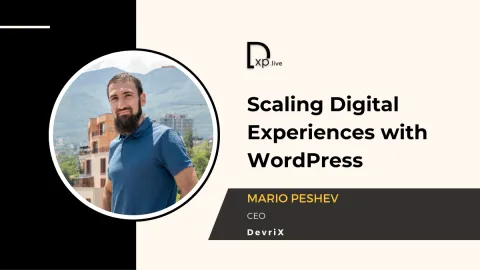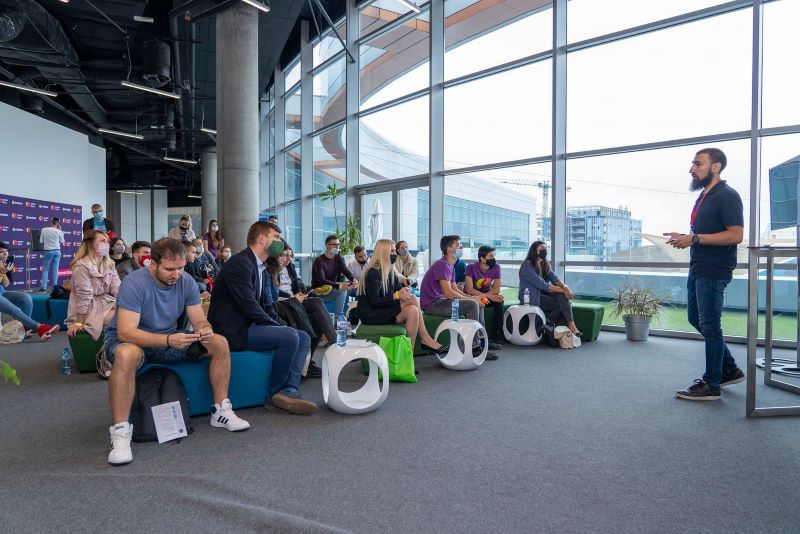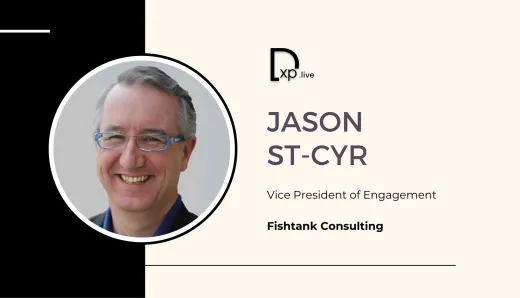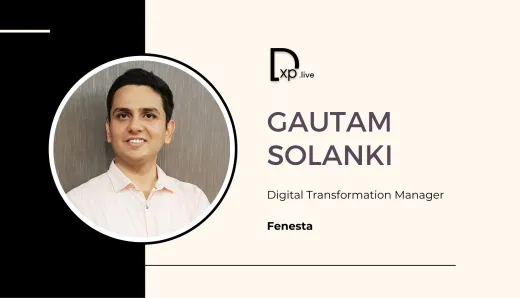Scaling Digital Experiences with WordPress: Insights from Mario Peshev, CEO of DevriX
Uncover the future of content management, AI, and SEO through the lens of a global business advisor and WordPress pioneer

About Mario Peshev
Mario Peshev is the CEO of DevriX and founder of Growth Shuttle, a global business advisor, and a WordPress veteran with over 15 years of experience in the field. He has scaled multiple businesses to seven figures, including bootstrapped ventures and startups, and successfully exited a Shopify SaaS company. DevriX, under his leadership, has worked with major publishers generating over a billion pageviews annually and eCommerce platforms with over $400 million in gross merchandise volume (GMV).
As an advocate for open-source solutions, Mario has been pivotal in the enterprise adoption of WordPress, helping businesses transition from proprietary platforms to scalable, flexible systems. He is an angel investor with 18 startups in his portfolio and a columnist for Entrepreneur and Forbes, where he shares his insights on B2B marketing and business scaling. His book MBA Disrupted is a bestseller, further solidifying his thought leadership. Mario is also a prominent speaker, having contributed to WordCamps and meetups, and co-organized WordCamp Europe.
Introduction:
In the fast-evolving digital landscape, businesses are increasingly seeking agile, scalable, and powerful content management systems to stay competitive. WordPress, the world’s leading CMS, has become a go-to platform for enterprises and publishers alike. Today, we are thrilled to be joined by Mario Peshev, CEO of DevriX, a WordPress development powerhouse, and a global advisor for B2B businesses.
With decades of experience in scaling digital platforms and working with some of the biggest names in publishing, Mario shares with us his insights on how WordPress has transformed the digital experience landscape. From integrating martech solutions like HubSpot and Salesforce to leveraging AI for SEO and content optimization, Mario offers a unique perspective on what it takes to create impactful digital experiences in today's competitive market.
In this interview, we’ll dive into how content management is shaping the future of digital transformation, what trends to watch in 2025, and how WordPress is evolving to meet the demands of enterprises worldwide.
1. As the CEO of DevriX and a WordPress expert, what are the key factors that make WordPress an ideal platform for scaling digital experiences, especially for enterprises?
Mario: I've been an avid WordPress user since 2006 and built my first PR platform on top of the CMS in 2008, with several startups and businesses revolving around it since. Open source is a strong value proposition when building for the enterprise - being stuck with a corporate, self-hosted platform and reliant on an in-house team to cherry-pick features that make sense for the business isn't always an effective and reliant approach for massive corps with serious needs.
And unlike other platforms, WordPress currently powers nearly 44% of the web - from starter blogs through some of the largest publishers on the planet to tens of thousands of enterprise projects.
2. Your company has helped publishers generate over a billion page views. What role does content management play in optimizing these massive digital experiences?
Mario: Oh, there's a lot to unpack here. The editorial experience for massive publishers has to be streamlined, adapted to the org needs, and well integrated with DXP systems, data warehouses, content workflow solutions and integrations across a myriad of tools. Each organization has different needs and based on the content formats, the UX has to match that.
As some teams boast over 100 writers and editors, saving even an hour a week with a back-end checklist or a quick embed feature quicky results in six figures saved for the business annually - and that's just the beginning.
We go as far as integrating LLMs for SEO optimization or enriching content with data and stats, proofreading, cross-linking and referencing other sources from the knowledgebase, and much more.
3. How does your experience with WordPress differ when working with traditional businesses compared to scaling SaaS or affiliate platforms? What challenges do each bring?
Mario:
It's all about the underlying business model. What's the main revenue driver for the business? Is it ads, lead generation, funnel development, upselling enterprise solutions, wholesale products, subscriptions?
We dive deep into the ICP needs and the current funnels at play, and then incorporate our Experimentation as a Service framework to keep refining through landing pages, content optimizations, building tools and checklists, and refining campaigns on the go.
4. As someone who has scaled multiple businesses, what advice would you give to organizations looking to integrate content management systems like WordPress into their digital transformation strategies?
Mario:
We recently migrated the core ASP .NET website of a business with 40 million app customers to WordPress after several years of growing their global marketing blogs and knowledge base.
It was a long transition as enterprise leaders weren't sold on the power of WordPress first. With every single migration, our internal tools and standalone blogs were overdelivering with speed and SEO solutions, reusable blocks and components, and faster velocity times compared to the .NET builds that took longer and required more manpower to manage.
It's quite common for enterprises to start with a one-pager, specific landing pages, a standalone blog, a separate partnership platform on top of WordPress - and gradually move the rest of the infrastructure to WordPress.
5. In your opinion, how do content management systems like WordPress evolve with the increasing adoption of AI and automation in marketing and lead generation?
Mario: Being the CMS leader (and the largest platform for building web solutions on the planet),
WordPress is attractive for 3rd party providers and SaaS solutions seeking adoption and growing their customer base. Which means that most SaaS leaders prioritize building extensions and plugins for WordPress as they can tap a market of 70 million new businesses.
Considering that many enterprises end up incorporating 30-40 different SaaS tools in their suites, we frequently treat WordPress as the general mainframe of an organization - the power dashboard that integrates with all other systems, consolidating data and rerouting requests across other niche solutions.
6. With a focus on martech integrations like HubSpot and Salesforce, how do you ensure seamless digital experiences across different platforms when managing content through WordPress?
Mario: It's worth noting that DevriX is also a HubSpot certified agency partner - and we do engage in complex workflow development solutions (and even standalone HubSpot offers). This is fully compatible with WordPress and managing multiple WordPress properties tied to the same HubSpot marketing or sales hub.
In some cases, we end up integrating multiple CRMs or ERPs as different departments rely on several platforms at ones, some managed by sales, others - by marketing, or ops, or CX teams.
Being able to efficiently route and cross-reference data across other systems is one of WordPress's strengths today.
7. You’ve worked extensively on programmatic SEO through your DevriX portfolio. How important is SEO in creating impactful digital experiences, and what trends are you seeing in the CMS space?
Mario: SEO has definitely undergone transformation over the past year - ever since the Helpful Content Update enforced in September of 2023. Some of our properties took the hit despite following the best practices. Luckily, they also picked back up in August with the latest Core update after waves of complaints and the DOJ getting involved in the process.
So relying solely on SEO could be detrimental to publishers even when working with a Semrush agency partner like DevriX. Sometimes algorithms calibrate toward specific niches or category sites, with Reddit's prominent position over the past year growing higher than ever.
Speculations that this is related to a $60M contract between Google and Reddit have been floating over the web, though any conclusions are left to the reader.
In any case, SEO is still going strong, with other players picking up here - from alternative search engines like Bing and Yahoo to AI-based search platforms like Perplexity to vendor search via ChatGPT, Claude, or Gemini.
We've received a number of leads from ChatGPT searches this year thanks to our prominent position in global SERP, collecting links from various sources, and professional business directories.
All of the best SEO practices translate and transfer to other search mediums, too.

8. Having contributed to the WordPress ecosystem for years, how do you see the community’s role in shaping the future of digital experiences?
Mario: WordPress has been a trendsetter across the web on multiple occasions.
When 44% of the web is empowered by the same platform, it's only natural that hosting companies, browsers, mobile apps get attuned to what's possible and industry standards in rendering, access control, progressive web app principles, and more.
A strong community with diverse opinions and outlooks on the web can help shape the future even better.
9. For B2B businesses looking to build a strong digital presence, what should they prioritize when choosing a content management system, and why?
Mario:
B2Bs should revisit their marketing strategy in 2025 and onward based on the recent digital shifts over the past 18 months.
SEO turbulence, underperforming paid ads, longer B2B sales cycles for BDR teams, dark social (conversation happening in closed groups and communities), the ability to intercept data and identify visitors on the site,
AI-backed tools for outreach and personalized nurturing. This landscape requires agility and velocity - and utilizing a powerful platform that could be molded indefinitely is a safe bet compared to proprietary 3rd party solutions
that are limited in scope.
Effective B2Bs now incorporate lead forms, AI-driven audit tools, expert calculators and self-assessment engines, quizzes, and other non-trivial applications and tools within their content marketing strategy. WordPress is more than capable to handle, manage, and distribute all of these.
Don't be limited by the constraints of a white text screen that doesn't get you further than a standard blog post.




